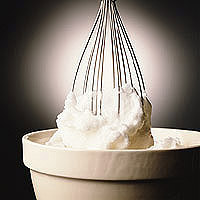health guides
Cream

Varieties
Sweet creams products
In modern dairy production, the cream is separated by centrifugal force. The butterfat content in half-and-half is 10.5 to 18%; in light (coffee) cream, 18% to 30%; in medium cream, 25 to about 30%; in light whipping cream, 30 to 36%; and in whipping cream, 36% or more.
Sour cream products
Various types of sour cream are produced by culturing cream or milk with lactic-acid bacteria. Rennet or nonfat milk solids may be added to provide body. A variety of sour-cream products are available, but true sour cream must by definition contain at least 18% milk fat by weight. Sour half-and-half, low-fat sour cream, and light sour cream are all made with half-and-half. Fat-free sour cream is made from cultured skimmed milk. A cholesterol-free sour cream alternative is made with skimmed milk and vegetable oil.
Whipped cream
A single tablespoon of whipped cream is relatively low in saturated fat; the trick is whether any of us can actually limit ourselves to just one tablespoonful. Here are some potential strategies for reducing the intake of saturated fats:
Make whipped cream from part-skimmed milk or low-fat cream. Chill the milk or cream thoroughly, and use a cold bowl and beaters; serve the whipped cream within an hour. Experiment to find a naturally low-fat product that can be used as a whipped topping.
Try a range of alternatives to whipped cream. Look for unprocessed foods such as fresh yoghurt, crème fraîche, and other natural foods that are low in saturated fat and carbohydrates.
Copyright © 2024 TraceGains, Inc. All rights reserved.
Learn more about TraceGains, the company.
The information presented in the Food Guide is for informational purposes only and was created by a team of US–registered dietitians and food experts. Consult your doctor, practitioner, and/or pharmacist for any health problem and before using any supplements, making dietary changes, or before making any changes in prescribed medications. Information expires December 2024.


 We are proud to announce that
We are proud to announce that  As the market evolves, customers increasingly request a wider variety of omega-3 options for their lipid...
As the market evolves, customers increasingly request a wider variety of omega-3 options for their lipid...  Maintaining healthy glucose levels is crucial for preventing metabolic conditions like diabetes,...
Maintaining healthy glucose levels is crucial for preventing metabolic conditions like diabetes,...  Looking at formulating a new vitamin blend? Discover
Looking at formulating a new vitamin blend? Discover 







































